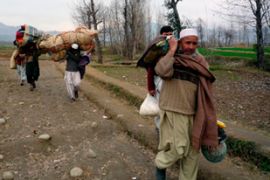Pakistan’s Swat gets sharia courts
Islamic law judges start work as religious leader calls on non-sharia judges to quit.

Mullah Sufi Muhammad, the local religious leader who negotiated the deal, had threatened to relaunch regional protests if Islamic courts were not established quickly.
Court controversy
Sufi Muhammad, who leads Tehrik-e-Nifaz Shariat Muhammadi (TNSM), or movement for the introduction of sharia, has called on all non-sharia judges in Swat valley to stand down from their posts.
| In depth |
|
|
At least 16 government-appointed judges were reported to have not turned up for work in Swat following the edict.
Al Jazeera’s Hamidullah Khan said the move puts Sufi Muhammad at odds with the NWFP provincial assembly, which had earlier decided that judges appointed by the government should continue on in their roles.
However, Moulana Rizwanullah, Sufi Muhammad’s son and deputy, said the TNSM would not allow any other law systems to contradict sharia.
He reiterated Sufi Muhammad’s statements that there are no non-sharia judges in Islam, adding that there is also no concept of a lawyer.
Islamic supreme court
Sufi Muhammad’s group also said it would open a Dar ul-Qaza, or Islamic supreme court, where people could appeal against the decisions of qazis.
The decision of the Dar ul-Qaza would be final, the TSNM said, and cannot be challenged in any other Pakistani court, religious or otherwise.
Sufi Muhammad further said he would oversee the Swat valley legal system, and upon finding any perceived flaws with any of the qazis, he would not hesitate to replace them.
The provincial government has not yet responded to Sufi Muhammad’s statements.
Fighting broke out in Swat in late 2007 after Sufi Muhammad was arrested by the government.
Maulana Fazlullah, Sufi Muhammad’s son-in-law and leader of the Taliban in Swat, had demanded the religious leader’s release, as well as the introduction of sharia in the area.
Fazlullah’s fighters, who control much of the valley, declared an indefinite ceasefire following the February peace deal and the Pakistan army suspended its operations in the region.
At least 1,200 people were killed in the violence and thousands more were forced to flee their homes.

 Talking to the Taliban
Talking to the Taliban